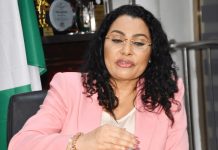- Unbudgeted JV, subsidy cut 2017 oil earnings, says World Bank
-
Kachikwu outlines strategies to reposition Africa’s oil industry
-
OPEC meets Friday to decide crude oil output policy
The Nigerian National Petroleum Corporation (NNPC) has rolled over its crude for oil products contracts worth about $6 billion by six months until the end of the 2018, the Group Managing Director of the corporation, Dr. Maikanti Baru, has said.
This is coming as a report from the World Bank, the Nigeria Biannual Economic Update, has shown that two unbudgeted costs incurred by the federal government in 2017 may have contributed to the reduction in oil revenues that it could have earned within the year.
The Minister of State for Petroleum, Dr. Ibe Kachikwu, has also laid out plans on how he would lead African oil producers as the President of the African Petroleum Producers Organisation (APPO).
Also the Organisation of Petroleum Exporting Countries (OPEC) meets Friday to decide output policy amid calls from top consumers such as the United States, China and India to cool down oil prices and support the world economy by producing more crude.
NNPC’s crude swap deals, which were previously referred to as offshore crude oil processing agreements (OPAs) and crude-for-products exchange arrangements, are now known as Direct Sale-Direct Purchase Agreements (DSDP).
NNPC had in May 2017, signed the deals with local and international traders to exchange about 330,000 barrels per day (bpd) of crude oil for imported petrol and diesel, as part of measures to sustain the supply of petroleum products across the country.
But Reuters quoted Maikanti as saying in Vienna, Austria, Thursday that the deals, which are due to expire by the end of this month, have been extended until the end of this year.
“We have rolled it over until the end of December,” Baru said on the side-lines of the OPEC seminar in Vienna.
Unlike the 2016 contracts, which included only companies with refineries so as to cut out middlemen, the beneficiaries of 2017 contracts include international trading houses, and not just refineries.
Some of the companies that benefitted include Varo Energy, Societe Ivorienne de Raffinage (SIR), Total and Cepsa.
Each of the 10 oil traders/refineries partnered local Nigerian companies to win 33,000 barrels per day allocations.
According to the list, Trafigura partnered AA Rano to clinch 33,000 barrels per day; Petrocam paired with Rainoil and Falcon Crest to win 33,000 bpd; Mocoh partnered Heyden Petroleum to get 33,000 bpd; Cepsa paired with Oando to win 33,000 bpd; while Sahara is partnering Societe Ivorienne de Raffinage (SIR) for 33,000 bpd.
Five other groups that also got 33,000 bpd each include: Mercuria and Matrix/Rahamanniya; Socar and Hyde; Litaso and MRS; Vitol and Varo; and Total, which is partnering its Nigerian subsidiary.
In another development, a report by the World Bank Macroeconomic, Trade and Investment Global Practice Nigeria Team said an unbudgeted N1.2 trillion joint venture costs paid by the NNPC out of federal government’s oil export revenue, as well as unbudgeted fuel subsidies deducted from oil export revenues by the NNPC, all depleted government’s oil revenue.
The report, which was obtained from the webpage of the Bank, stated that about N128.9 billion was deducted by the NNPC as at November 2017 from oil revenues due to the Federation Account, as subsidy payments for imported petrol.
“Federally collected revenues continued to underperform in 2017 and fiscal deficits remained high. Only 60 per cent of targeted revenues were realized,” said the report.
“Oil revenue performance was particularly low at 53 per cent of the budgeted amount despite rising oil prices and output in 2017. One reason was that the government had not budgeted for N1.2 trillion in joint venture costs paid by the Nigeria National Petroleum Corporation (NNPC) out of government oil export revenue, resulting in much lower net oil revenues than budgeted,” the report said.
“The NNPC also deducted unbudgeted fuel subsidies from oil export revenues, representing additional revenue losses. Landing and transportation costs for imported Premium Motor Spirit (PMS or petrol) were higher than the cap on the domestic pump price. By November, the NNPC deducted subsidy payments of N128.9 billion from oil revenues due to the Federation Account in 2017. Independent oil marketers stopped importing PMS to avoid losses,” it added.
According to the report, the federal government’s 2017 budget implementation was hampered by shortfalls in federally and internally collected revenues, adding that its share of oil revenue was only 53 per cent of budget.
The corporation’s Group General Manager, Public Affairs, Mr. Ndu Ughamadu, said: “We have not sighted the said report to really understand the content.”
Meanwhile, in a key note speech he delivered at the seventh International Seminar of the Organisation of Petroleum Exporting Countries (OPEC) in Vienna, Austria, Kachikwu said he planned to work collaboratively with other APPO member countries to mainstream growth of the continent’s oil industry.
He also stated that he would attempt to reset the investment criteria in the continent’s oil industry to make attracting investments into it easier in the nearest future.
Tweets from the ministry of petroleum resources, which THISDAY monitored, contained some of what Kachikwu said in his speech.
He said that for Africa to be prepared for the future of oil, its countries must embrace collaboration and collectivism, adding that this would enable the continent achieve sustainable investment in her oil and gas sector.
Meanwhile, OPEC meets Friday to decide output policy amid calls from the United States, China and India to pump more oil into the international market so as to reduce oil prices and support the world economy.
OPEC edged closer Thursday towards raising oil output, with Iran softening its opposition to an increase and Saudi Arabia warning of supply shortages and price rallies if production remained stable.
A production rise of about one million barrels per day (bpd) or around one per cent of global supply was emerging as a consensus for the group and its allies, OPEC sources told Reuters, adding that Iran could agree under certain conditions.
Russia, which is not in OPEC, has proposed producers raise output by 1.5 million bpd.
Saudi Energy Minister Khalid al-Falih said Thursday the world needed at least an extra one million bpd to avoid a shortage in the second half of 2018.
OPEC and its allies have since last year been participating in a deal to cut output by 1.8 million bpd.
The measure has helped rebalance the market in the past 18 months and lifted oil to around $73 per barrel Thursday from as low as $27 in February 2016.
The price of the global benchmark, Brent crude oil had hit $80 before it dropped to $73.
But unexpected outages in Venezuela, Libya and Angola have effectively brought supply cuts to around 2.8 million bpd in recent months.
Iran’s output is also likely to fall in the second half of this year due to new U.S. sanctions.
Iran, OPEC’s third-largest producer, has so far been the main barrier to a new deal as it said on Tuesday OPEC was unlikely to reach an agreement and should reject pressure from U.S. President Donald Trump to pump more oil.
But on Wednesday, Iranian Oil Minister Bijan Zanganeh said OPEC members that had over-delivered on cuts in recent months should comply with agreed quotas.













